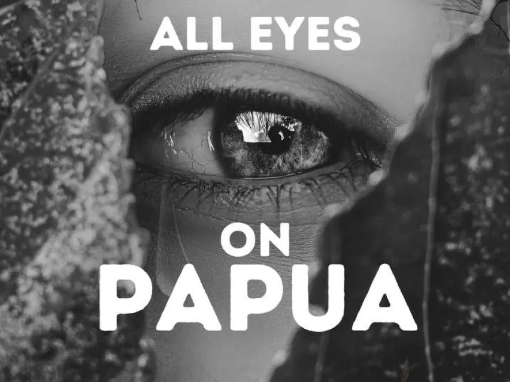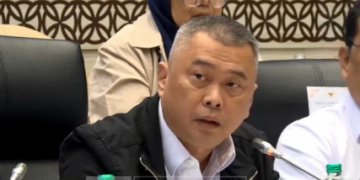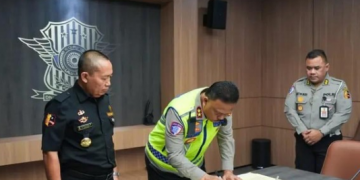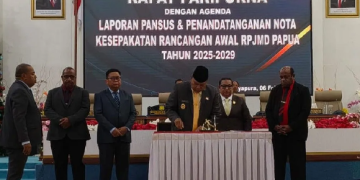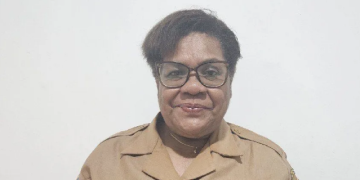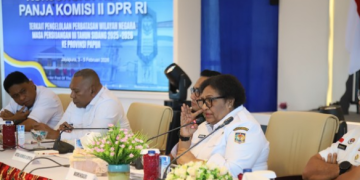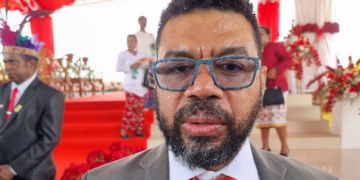PapuaAround.com – Amid the widespread ‘All Eyes on Rafah’ campaign on social media, a similar call to action has emerged, urging Indonesians to focus on the situation in Papua. The hashtag ‘All Eyes on Papua’ has been trending as a show of solidarity with the Papuan communities fighting against the development of palm oil plantations in their region.
According to Greenpeace, the Indigenous Awyu people in Boven Digoel, South Papua, and the Moi people in Sorong, Southwest Papua, are engaged in legal battles against the government and palm oil companies to protect their ancestral forests. These cases have reached the appeal stage in the Supreme Court.
Environmental activist Hendrikus Woro from the Awyu tribe has filed a lawsuit against the Papua Provincial Government over an environmental feasibility permit granted to PT Indo Asiana Lestari (IAL). This permit covers an area of 36,094 hectares, more than half the size of Jakarta, within the ancestral forest of the Woro clan, part of the Awyu tribe.
Hendrikus’s lawsuit was dismissed in both the first and second courts. Now, the Supreme Court is the Awyu people’s last hope to protect their ancestral forest, a heritage and vital resource for the Woro clan.
Meanwhile, the Moi Sigin sub-tribe is fighting against PT Sorong Agro Sawitindo (SAS), which plans to clear 18,160 hectares of their ancestral forest for a palm oil plantation. Previously, PT SAS held a concession for 40,000 hectares in Sorong Regency. In 2022, the central government revoked PT SAS’s forest release and business permits. However, PT SAS contested this decision and sued the government in the Jakarta Administrative Court (PTUN).
Representatives of the Moi Sigin community intervened in the PTUN lawsuit in December 2023. After the initial lawsuit was dismissed in January, they appealed to the Supreme Court on May 3, 2024.
Last Monday, May 27, 2024, environmental activists from the Awyu and Moi tribes held prayers and rituals in front of the Supreme Court building in Central Jakarta. They wore traditional attire, showcasing their cultural identity.
“We traveled a long, complicated, and expensive journey from Papua to Jakarta to ask the Supreme Court to restore our rights by canceling the palm oil company permits we are fighting against,” said Hendrikus Woro.
Fiktor Klafiu, a representative of the Moi Sigin community, also urged the Supreme Court to deliver justice for the indigenous people. “The presence of PT SAS has severely harmed us. The ancestral forest is where we hunt and gather sago; it is our pharmacy. All our needs are in the forest. If our ancestral forest is lost, where else can we go?” he emphasized.
Through this peaceful demonstration, the Awyu and Moi tribes hope that the Supreme Court will issue a ruling that protects their ancestral forests. Their struggle is part of an effort to preserve their heritage and the sustainability of their lives, which depend on the forest.
The ‘All Eyes on Papua’ campaign not only highlights local issues but also calls on all Indonesians to be more aware of the rights of the Papuan indigenous people. Through public support and social media, the aim is to ensure this issue receives the attention it deserves from the authorities, leading to a fair decision for the future of Papua’s ancestral forests and the communities that depend on them.
In this context, similar social media campaigns have proven effective in rallying support and advocating for justice for indigenous communities. It is hoped that the ‘All Eyes on Papua’ call will continue to resonate until justice is achieved for the indigenous people of Papua.
As a nation that values diversity and justice, the attention and support of all Indonesians are crucial to ensuring that the rights of indigenous people are protected. Let us all be part of this positive change by continuing to monitor the legal process and support the struggle of the indigenous people of Papua.
Read also: Supreme Command, The Dominant Force of Kostrad’s Senior Generals
Source: Tempo.

